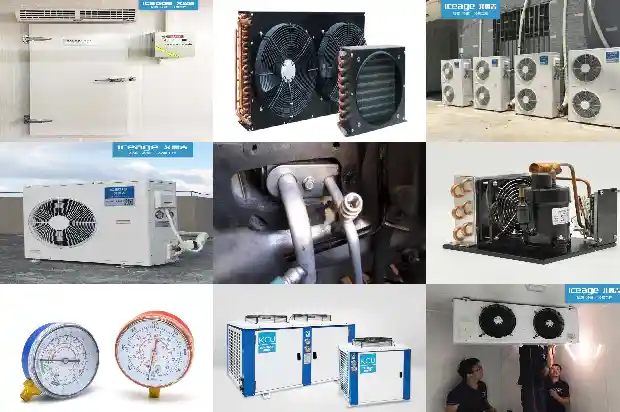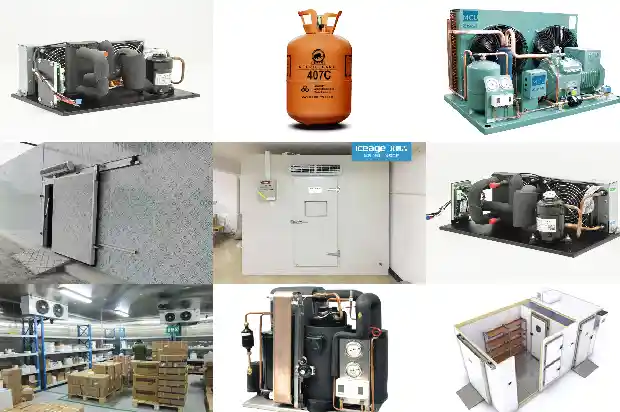The Most Comprehensive Knowledge of Refrigeration Oil, Definitely Useful in the Future!
2025-03-09
- Classification of Refrigeration Oil
One type is the traditional mineral oil; the other type is the synthetic polyol ester oil such as PO, often called polyester oil, and it is also the synthetic poly(ethylene) glycol lubricating oil. Their Chinese names are not very unified. POE oil can not only be well used in the HFC refrigerant system but also in the hydrocarbon refrigerant system. PAG oil can be used in systems where HFCs, hydrocarbons, and ammonia are used as refrigerants. - Main Functions of Refrigeration Oil
◆ Reduce friction work, frictional heat, and wear;
◆ Fill the sealing parts with oil to ensure the sealing performance and prevent the leakage of the refrigerant;
◆ The movement of the oil takes away the debris generated by metal friction, playing the role of cleaning the friction surface;
◆ Provide hydraulic power for the unloading mechanism. - Performance Requirements of Refrigeration Oil
◆ Appropriate Viscosity: In addition to ensuring good lubricity on the friction surfaces of all moving parts, the viscosity of the refrigeration oil should also take away part of the heat from the refrigerator and play a sealing role. If the refrigerant used in the refrigerator has a large miscibility with the refrigeration oil, it is necessary to consider using an oil product with a higher viscosity to overcome the influence of the lubricating oil being diluted by the refrigerant.
◆ Low Volatility and High Flash Point: The greater the evaporation amount of the refrigeration oil, the more oil will circulate with the refrigerant. Therefore, it is required that the distillation range of the refrigeration oil is as narrow as possible, and the flash point should be at least 25-30°C higher than the exhaust temperature of the refrigerator.
◆ Good Chemical Stability and Thermal Oxidation Stability: The final compression temperature during the operation of the refrigerator can reach 130°C-160°C. At this temperature, the refrigeration oil will be continuously decomposed and deteriorated by heat, generating carbon deposits, which will lead to failures and wear of the refrigerator. Moreover, the decomposition products of the oil will chemically react with the refrigerant, deteriorating the refrigeration effect, and the generated acidic substances will strongly corrode the components of the refrigerator.
◆ Free of Water and Impurities: Because the freezing of water in the evaporator will affect the heating efficiency, and contact with the refrigerant will accelerate the decomposition of the refrigerant and corrode the equipment, the refrigeration oil should not contain water and impurities.
◆ Others: The refrigeration oil should also have good anti-foaming properties, and it should not dissolve or expand materials such as rubber and enameled wires. When used in a closed refrigerator, it should have good electrical insulation. - Factors to Consider When Selecting Refrigeration Oil
◆ Viscosity: The higher the rotational speed of the compressor, the higher the viscosity of the refrigeration oil used should be.
◆ Thermal Stability: Thermal stability is generally measured by the flash point of the refrigeration oil. The flash point refers to the temperature at which the vapor of the refrigeration oil ignites and flashes when encountering fire.
The flash point of the refrigeration oil must be higher than the exhaust temperature of the compressor. For example, the flash point of the refrigeration oil used in R717 and R22 compressors should be above 160°C.
◆ Fluidity: The refrigeration oil should have good fluidity at low temperatures. In the evaporator, due to the low temperature, the viscosity of the oil increases and the fluidity deteriorates. When a certain temperature is reached, the refrigeration oil stops flowing, and this temperature is called the pour point of the oil. The refrigeration oil of the refrigerator is required to have a low pour point, especially for low-temperature refrigerators, the pour point of the oil is very important.
◆ Solubility: The solubility of various refrigerants with refrigeration oil is different, roughly divided into three categories: one is mutually insoluble, one is mutually infinitely soluble, and the other is between the above two.
◆ Cloud Point: The temperature at which the refrigeration oil begins to precipitate paraffin (the oil becomes turbid) is called the cloud point. When there is a refrigerant present, the cloud point of the refrigeration oil will decrease.
- Main Reasons for the Deterioration of Refrigeration Oil
◆ Mixing in Water: Due to the infiltration of air into the refrigeration system, the moisture in the air mixes with the refrigeration oil after contact; when the water content in the refrigerant is high, it will also cause water to mix into the refrigeration oil. After water is mixed into the refrigeration oil, the viscosity decreases, causing corrosion to the metal. In the Freon refrigeration system, it will also cause the "ice blockage" phenomenon;
◆ Oxidation: During the use of the refrigeration oil, when the exhaust temperature of the compressor is high, it is likely to cause oxidation and deterioration. Especially, the refrigeration oil with poor chemical stability is more prone to deterioration. After a period of time, residues will form in the refrigeration oil, deteriorating the lubrication of the bearings and other parts. The mixing of organic packing, mechanical impurities, etc. into the refrigeration oil will also accelerate its aging or oxidation;
◆ Mixing of Refrigeration Oils: When several different brands of refrigeration oils are mixed and used, it will cause the viscosity of the refrigeration oil to decrease, and may even destroy the formation of the oil film, damaging the bearings; if the two refrigeration oils contain antioxidant additives with different properties, when mixed together, there may be a chemical change, forming precipitates, affecting the lubrication of the compressor, so attention should be paid during use.
◆ Presence of Impurities in the Refrigeration Oil. - How to Select Refrigeration Oil
◆ Select Lubricating Oil According to the Compression Type: The compressors of the refrigerator are of three types: piston type, screw type, and centrifugal type. The lubricating oils of the first two types are in direct contact with the compressed refrigerant, and the mutual influence between the lubricating oil and the refrigerant should be considered. The lubricating oil used in the centrifugal type is only used to lubricate the rotor bearings, and it can also be selected according to the size of the load and the rotational speed.
◆ Select Lubricating Oil According to the Type of Refrigerant: For the lubricating oil in direct contact with the refrigerant, the mutual influence between the two should be considered. For example, refrigerants such as Freon can dissolve in mineral oil, so the viscosity grade of the selected lubricating oil should be one grade higher than that when using an insoluble refrigerant to prevent the lubricating oil from not being able to ensure lubrication after being diluted. In addition, it should also be noted whether a small amount of lubricating oil mixed into the refrigerant will affect the operation of the refrigeration system. The flocculation point of the refrigeration oil is a quality index to check whether the lubricating oil mixed into the refrigerant precipitates wax crystals and blocks the refrigeration system.
◆ Select Lubricating Oil According to the Evaporation Temperature of the Refrigerant: Generally speaking, for a refrigerator with a low evaporation temperature of the refrigerant, a refrigeration oil with a low pour point should be selected to prevent the lubricating oil carried into the refrigeration system by the refrigerant from condensing on the throttle valve and the evaporator, affecting the refrigeration efficiency. For a refrigerator using ammonia as the refrigerant, the pour point of the lubricating oil used should be lower than the evaporation temperature. For a refrigerator using Freon as the refrigerant, the pour point of the lubricating oil can be slightly higher than the evaporation temperature.
◆ Select Lubricating Oil According to the Working Conditions of the Refrigerator.
Related Articles
- Popularize Refrigeration Knowledge You've Never Noticed, Which Is Actually Very Crucial
- Practical Knowledge on Freeze Protection of Air - conditioning Equipment
- Basic Knowledge of Valve - type Components in Refrigeration Systems (Technical Sharing)
- Basic Knowledge of Cooling Towers
- Knowledge, Installation and Maintenance of Cold Storage Systems
- Obscure Knowledge of Static Pressure, Dynamic Pressure, Latent Heat and Sensible Heat in the HVAC Industry
- Fin Spacing Design of Cooler and Several Knowledge Points of Defrosting in Cold Storage
- Noise Reduction and Vibration Damping in Refrigeration and Air Conditioning Systems
- Several Key Components on the Oil Circuit of the Refrigeration System
- The Use and Common Maintenance Methods of Refrigeration Compressors
- Why Does the Refrigeration System Need to Be Evacuated?
- Micro Refrigeration System
- HVAC - Common Auxiliary Components of the Refrigeration System
- The Influence of Temperature Changes on the Air Conditioning Refrigeration System
- Analysis of the Main Functions and Components of Refrigeration Air Conditioners
- Valves in the Refrigeration System
- HVAC - Solving the 5 Common Problems in the Refrigeration System
- Eliminate the "Blockage" Faults (Ice Blockage, Dirt Blockage, Oil Blockage) of the Refrigeration System in 5 Minutes
